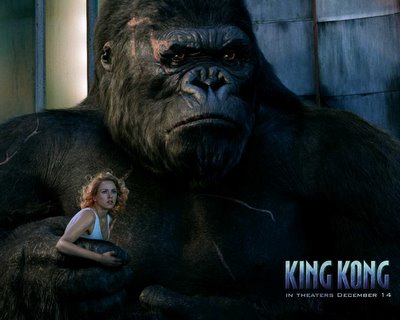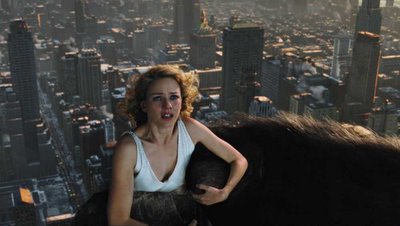 Warning: There are SPOILERS ahead, so read someone else's blog if you haven't seen the movie yet and don't want to know.
Warning: There are SPOILERS ahead, so read someone else's blog if you haven't seen the movie yet and don't want to know.Acknowledgement: KING KONG photos courtesy/copyright Universal.
1. I don't know if it's a good thing that Fay Wray didn't live to see this movie or not. I think she would have liked it enough to have her heart broken a little by it. Fay Wray was Ann Darrow, "the girl in the hairy paw," till the day she died, and that's as it should have been. I'll always love Fay, but I think Naomi Watts is Ann Darrow for me now.
2. I also think Jackson's Kong (Andy Serkis) is Kong for me now. He better embodies a living, breathing animal and conveys a richer range of emotions. I'll always love the original, of course, but I suspect Willis O'Brien's stop-motion model will look more like an eye-rolling toy to me on future viewings, its emotions limited to variations on fury and cute. I know the Obie-Kong inspired a lot of important film careers, but I feel certain this movie will plant seeds of its own. With this Kong, I instinctively knew that, when the theater curtain was raised on him, he would be sitting there slumped over, soulless and shamed -- not the upright manacled trophy of the 1933 film -- and it's a magnificent touch. So is the shot of the life fading from Kong's eyes before he plummets from the Empire State Building. Jackson allowed his King to hold his ground. Bravo.
 3. I've read some postings online by people who hated the movie because they could not accept the idea a woman could fall in love with a giant gorilla. Well, there's love and there is love. I had no trouble understanding that Ann bonds with Kong after witnessing the extent to which he was willing to protect her from harm (i.e., the T. Rex brood). This proved that she could be as assured of her safety in his company as she could be anywhere, whereas her own species had placed her in harm's way for commercial gain and would again; it was her open-hearted response to Kong's overwhelming show of love -- or, at least, devotion -- for her. I loved the way Kong made a show of his wounded pride afterwards by refusing to face her in his moment of victory; it was like he was reproaching her for everything he, a king in his world, had to endure because of her capricious decision to run away from him, and it's a fabulous moment when he forgives her by picking her up and flinging her onto his shoulder. In the midst of the Great Depression and unimaginable dangers, Kong becomes a Gibraltar-sized rock Ann can literally cling to. When she later climbs to the peak of the Empire State Building (another deal-breaker for some viewers), I can accept that she does this because she feels so safe in Kong's presence, even when he's vulnerable. She has already faced greater heights and dangers at his side. True, the top of the Empire State Building has got to be much less hospitable in wintertime than Jackson depicts it, but by this time in the movie, emotions should be overriding logic. This story is the very pinnacle of motion picture fantasy; if you need realism, find something with fewer people running away from dinosaurs.
3. I've read some postings online by people who hated the movie because they could not accept the idea a woman could fall in love with a giant gorilla. Well, there's love and there is love. I had no trouble understanding that Ann bonds with Kong after witnessing the extent to which he was willing to protect her from harm (i.e., the T. Rex brood). This proved that she could be as assured of her safety in his company as she could be anywhere, whereas her own species had placed her in harm's way for commercial gain and would again; it was her open-hearted response to Kong's overwhelming show of love -- or, at least, devotion -- for her. I loved the way Kong made a show of his wounded pride afterwards by refusing to face her in his moment of victory; it was like he was reproaching her for everything he, a king in his world, had to endure because of her capricious decision to run away from him, and it's a fabulous moment when he forgives her by picking her up and flinging her onto his shoulder. In the midst of the Great Depression and unimaginable dangers, Kong becomes a Gibraltar-sized rock Ann can literally cling to. When she later climbs to the peak of the Empire State Building (another deal-breaker for some viewers), I can accept that she does this because she feels so safe in Kong's presence, even when he's vulnerable. She has already faced greater heights and dangers at his side. True, the top of the Empire State Building has got to be much less hospitable in wintertime than Jackson depicts it, but by this time in the movie, emotions should be overriding logic. This story is the very pinnacle of motion picture fantasy; if you need realism, find something with fewer people running away from dinosaurs.4. I didn't catch a screen credit for him, but I believe that's Howard Shore who is seen conducting the orchestra at Kong's NYC debut. If it is him, his cameo must be painful to him now. How I would love to hear his rejected score! The James Newton Howard score that Jackson went with instead is, in a word, banal. It doesn't hurt the film, but neither does it lodge in the heart or memory.
5. Jack Black. Loved him in THE SCHOOL OF ROCK (which is always a "Stop" sign when I'm channel surfing), but I didn't for a moment buy him as a filmmaker familiar with or equal to danger, or as someone with any working knowledge of emotion, for that matter. Denham should love adrenalin more than money, and he should also know the worth of human lives. Black's Denham is a cardboard money-grubber with no gravitas in his voice whatsoever; he's a Denham for our times, I suppose, for which woe is us. Black's shallow characterization makes the new KING KONG one of the most virulently anti-capitalist films I've seen -- an odd achievement for one of the most expensive films ever made.
6. As thrilled and moved as I was by everything during the wonderfully dizzy-making Empire State Building sequence, I dreaded the coming of the movie's end because I knew Jack Black had some obligatory words to say at the end, and I knew he couldn't possibly say them without sounding like he was quoting the 1933 film. And that's exactly how it played out -- magnificent ESB sequence, followed by a wimpy, hollow sentiment. (What does this Denham know about beauty? He didn't even look at Ann as she passed back through the gate alive.) I know Jackson would think the idea a sacrilege, but believe the movie would have worked better if he'd cut the line -- or given his Denham a more appropriate one to say.
6.5. Speaking of the ESB sequence, the reveal of the biplanes actually made me gasp and wince at the same time. A stunning moment.
7. I love the way Adrien Brody carries Naomi Watts off the Empire State Building on his back, the way Kong slung her onto his shoulder after defeating the T. Rex. That sort of attention to character detail is one of the movie's most winning traits. The movie might have been wiser to fade to the end credits there, rather than fading to Black.
8. Note to cameraman Andrew Lesnie: Was all that arty, jagged, slow-motion crap really necessary? It takes the movie out of its 1930s milieu far worse than Adrien Brody's haircut does (a common complaint in the KONG threads on the Classic Horror Film Boards). During the Great Depression, I suspect that self-barbering was a fairly common practice... and if truth be told, writers as a species are not the world's most image-conscious people.
9. It's a beautiful, heart-rending, flawed movie, clearly the product of a mind that has spent years in awed contemplation of its themes both stated and unstated. It is KING KONG on an operatic scale. Many of its faults and excesses are the result of having loved the original too much. I'm eager to see it again, even though I felt the movie didn't really begin to work as a whole until the ship reached Skull Island. There is an antic energy in the early NYC material that doesn't work for me, and it's in most of Jackson's pre-Tolkein films, too. For all that, the apple-stealing scene is perfect.
10. Naomi Watts and Adrien Brody -- they're Marilyn Monroe and Arthur Miller, right?